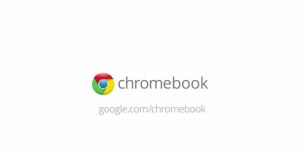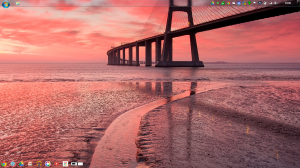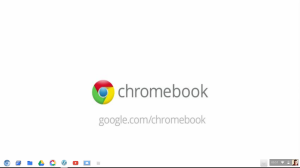
I originally intended this series to chart a month of me living entirely in the Google Chrome Web Browser then do another month of me living in Chromium OS via a virtualbox Chromium OS Virtual Machine, but after not being able to get the Chromium OS Virtual Machine to work properly I decided to go and nuke my Windows 7 Ultimate Install and use Chromium OS only.
This post will review my two weeks of living in the Google Chrome Web Browser & one week living in Chromium OS.
Two weeks of living in the Google Chrome Web Browser
The two weeks of living in the Google Chrome Web Browser was easy, but it provides the option to go back to Windows 7 Ultimate with it being at its heart, and things like being able to take Screenshots had to use Windows Paint to save them . I even themed my Windows install to look a little like Chrome OS to help with the experiment.
[caption id="attachment_1511" align="aligncenter" width="300"]
 Chrome OS Styled Windows 7 Desktop, Showing Windows 7 Taskbar[/caption]
Chrome OS Styled Windows 7 Desktop, Showing Windows 7 Taskbar[/caption]Working with a Chrome OS themed Desktop helped with the experience a little, and the two weeks I spent living with this setup was enough to convince me to have a look at living solely in Chrome OS and attempt to Install Chromium OS.
Two weeks of living solely in Chromium OS
My two weeks of living in Chromium OS has been really easy as I've not had any distractions from Windows or Windows Programs.
[caption id="attachment_1627" align="aligncenter" width="300"]
 Chromium OS/ Chrome OS Desktop[/caption]
Chromium OS/ Chrome OS Desktop[/caption]Chromium OS is more minimalistic & lightweight than Windows with my 1TB HDD having 908.2GB of free space left when I'd first booted into Chromium OS. The Chromium OS Desktop isn't as cluttered as the Windows 7 Desktop with just your Desktop Wallpaper and the Taskbar (Known as the Shelf in Chrome OS/Chromium OS), Chromium OS also has a fast Boot time along with a fast Shutdown time which means there is no need for a Hibernate function like in Windows, you also are more productive as you're not waiting as long for the OS to boot.
Battery life is also increased, but not to the quoted level that you get with official Chromebooks, there is also the lack of updates that you will get with official Chromebooks & Flash Player doesn't work in Chromium OS. Sound will vary depending if you have a Sound Card that's compatible with Chromium OS (Which the Sound Card on my Toshiba Laptop isn't compatible with Chromium OS) Sound actually works in Chromium OS, it was that I was using my USB Microsoft Life-Chat Headset that doesn't seem to work with Chromium OS/Chrome OS and will need an official Chromebook to verify if USB sound Cards & Headsets are supported or not.
Printing in Chromium OS
Printing is handled via Google Cloud Print in Chromium OS, so as long as you've got a Google Cloud Print ready Printer or a spare Computer with the Chrome Web Browser Installed to use as a Print Server you'll have no problem Printing in ether Chrome OS or Chromium OS (a feature that I've not used from my Chromium OS Install yet) Your Google Documents will print perfectly fine within Chromium OS but pictures don't printout without having to first create a Google Document and inserting pictures into it (shouldn't have to use this work around for pictures on an official Chromebook, but without having a Chromebook to hand I'm unable to test this out).
Applications in Chrome OS/Chromium OS
There is a wide choice of applications that can be Installed in Chrome OS/Chromium OS, from the Chrome/Chromium Web Store. Chrome OS/Chromium OS Applications aren't traditional Applications and are just bookmarks to Websites.
All the Google Services are present such as Google Search, GMail (including GMail Offline) Google Calendar, Google Keep, Google Maps, Google Drive/Docs (With Offline Support), Google Play (Music, Books, Play Website), along with a large list of other third Party Services such as Microsoft Outlook (outlok.com) and Games. If you're a Microsoft Office user you'll need to use the Microsoft Office Website (http://office.microsoft.com) and use the Microsoft Office Web Apps.
If you need more powerful Software such as Adobe PhotoShop, Premier Pro, After Effects e.t.c then your out of look as there are only basic photo editing Applications, unless you can find Online services that allow you to do what you want you'll be out of look.
Files in Chrome OS/Chromium OS
before you start using Chrome OS/Chromium OS you'll need to make sure that your files are on a FAT 32 formatted external HDD, USB flash drive, SD Card or online using Microsoft SkyDrive, Dropbox, Box or Google Drive otherwise you'll not be able to use them when you switch.
Storing your files on Google Drive is the easiest option as there is Google Drive support built right into the Chrome OS/Chromium OS File Browser. Chrome OS/Chromium OS allows you to store your files locally. In the case of Chromium OS you'll have whatever is left of your HDD/SSD after you've Installed Chromium OS. If you're using an official Chromebook then you'll have whatever is left of the 16GB SSD that's installed.
Chrome OS/Chromium OS has limited offline video & music playback functionality and some basic photo editing as well as limited Document creation & editing using Google Drive Offline.
Media Playback in Chromium OS
Previous Articles
- Part 1
- Part 2
- Part 3
- Part 4
- Part 5
- Part 6
- Part 7
- Part 8
- Part 9
- Part 10
- Part 11
- Part 12
- Part 13
- Part 14
- Part 15
- Part 16
- Part 17
- Part 18
- Part 19
- Part 20
- 3 Week Review
- Part 21
- Part 22
- Part 23
- Part 24
- Part 25
- Part 26
Roland


Having used a Chromebook for several month. The novelty of what Chrome OS is has become clear. It will never be enough for me over Windows OS or OS X. Its not even good enough to use over any Linux out there. The obstacles are lengthy from having to have either a web printer or run Chrome on another PC connected to the printer. This has to be the most ridiculous way to print. Seriously, why buy a notebook that can't physically connect to a printer? This is revolutionary? No, what Google did was create such a minimalist OS that forces users into every aspect of Google's ecosystem. Plan and simple Google made a obvious decision to make their ecosystem a sole purpose of a Chromebook. To me the apps are benign and not as useful as they could be. Many are rather Juvenal and amount to only a link to open a web site page. Is this really something that should even be considered a app?
ReplyDeleteI have also noticed plenty of apps that want to access a lot of your profile when the logic's of that need is in question. Not to mention the horrible hardware that seem to plague Chromebooks as if PC makers choose to use spare parts from old model netbooks to make Chromebooks. Other then the Pixel which is a joke at $1300 running such a OS as Chrome. One wonders why anyone would buy such hardware and not install at least a decent Linux OS on it? I know I have a lot of negatives about Chrombooks and its not that they cannot serve a purpose. But the facts are that they only serve a very narrow and minimalist needs user who can justify the limitations and is not wanting to spend a lot. Otherwise, Chromebooks don't satisfy the masses who still needs more options then what Google can offer.
@John, I sincerely could'nt agree with you more sir. Especially about the Pixel. Ridicoulous price with a shite OS. Now gimme a Pixel with say SlackWare Linux, PC-BSD, or Zorin OS and I'd be as happy as a clam in the mud. ('specially if it was a Pixel with SlackWare Linux). :-)
ReplyDelete@Jim It's possible to Install Ubuntu onto all Chromebooks as a dual boot set up, but I'm not 100% sure if it's possible to wipe the SSD and only have Ubuntu running on a Chromebook. But I'm guessing that Ubuntu on a Chromebook as a single boot system is a no no, & I don't think any of the Linux Distros that you've mentioned have a Chromebook version.
ReplyDeleteChrome OS isn't that bad as long as you know and except what you're letting yourself in for. But I couldn't agree more about the ridiculous price of the Pixel, as it really goes against the whole point of a Chromebook, If you want something that looks like a MacBook Pro with a similar price to a low end MacBook Pro why not just get a low end MacBook Pro, but I think Googles real intention with the Pixel was to get OEM's to do something different like add a Touch Screen which Acer have done with the C720P & have lights on the lid like that HP have done on the HP Chromebook 11 (they're the only two notable features of the Pixel that I've seen replicated on cheaper Chromebooks).